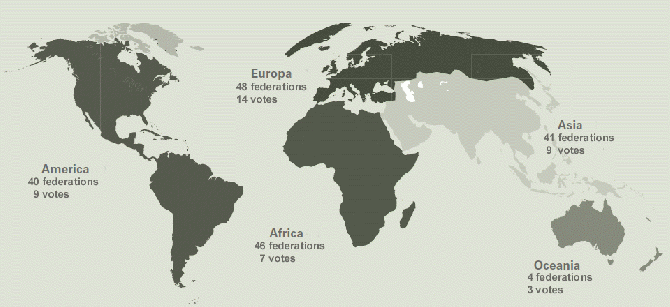Confederacy of Dunces? A look into the UCI presidential election
Complicated system will choose McQuaid or Cookson
The latest race content, interviews, features, reviews and expert buying guides, direct to your inbox!
You are now subscribed
Your newsletter sign-up was successful

With the news that British Cycling's Brian Cookson will oppose sitting UCI president Pat McQuaid in the election for the post this fall, many readers may wonder, how is the UCI president elected? Who gets to vote, and why? Our contributor Feargal Mc Kay breaks down the complicated process.
Tchmil rules out challenging McQuaid for UCI Presidency
Is Pat McQuaid's future in doubt?
Cycling Ireland to re-consider its nomination of McQuaid for UCI president
McQuaid backed by Swiss Cycling Federation for UCI Presidency
Cookson confirms candidacy for UCI presidency
McQuaid fires a warning shot at UCI presidential rival Cookson
The election of the president of the UCI is not in the hands of the UCI's licensed riders, nor is it in the hands of the 179 individual national federations, who are the UCI's actual members. Instead, the people who will get to sit down in Florence come September and choose which candidate is best suited to lead the UCI out of the post-USADA abyss are the representatives of the five international confederations.
The voters
Article 4 of the UCI's constitution states: "The members of the UCI shall be the national federations accepted by the Congress as being the representative organization for the sport of cycling in general in the country of that national federation."
Article 23 states: "Federations from the same continent shall be grouped together in a continental confederation, an administrative unit and integral part of the UCI." Except in exceptional circumstances – judged by the UCI's Management Committee – each federation is a member of the confederation of the continent on which its national capital lies.
At confederation level, voting is typically one member, one vote: ie. each federation that is a member of the confederation is equal, irrespective of the number of licenses it issues. Come UCI Congress, though, each Confederation has a set number of voting delegates, as defined by Article 36 of the UCI constitution: Africa, seven; Asia, nine; Americas, nine, Europe, fourteen; and Oceania, three.
Selection of those voting delegates is down to the individual confederation. The African confederation's rules, for instance, allow the voting delegates to be chosen by the confederation's management committee and do not require that they be elected by the member federations. The European confederation, on the other hand, elects its voting delegates at its general assembly.
The latest race content, interviews, features, reviews and expert buying guides, direct to your inbox!
How delegates vote at Congress – whether en bloc or by proportional representation of the wishes of the confederation's members – appears to be left up to each confederation to decide for itself as it sees fit. With lobbying taking place right up to the election, the ultimate decision as to who to vote for rests with the chosen delegates.
In addition to the voting delegates sent by the confederations, each federation is entitled to send three delegates to Congress, but they have little more than observer status, having no entitlement to vote. At the 2011 Congress, held in Copenhagen, 77 federations sent delegates as observers.
The vote
Article 27 of the constitution governs the election process, requiring the UCI to hold an annual Congress, during which will take place the election of the president and nine other members of the Management Committee.
Voting for this is by way of secret ballot of the delegates representing the international confederations with a simple majority – ie. greater than 50% of the votes cast – being sufficient to deem a candidate elected. Seven of those ten Management Committee members must come from European federations. (The presidents of the five confederations are also members of the Management Committee, and two additional members may be co-opted.)
At the 2011 Congress – the last for which minutes are available on the UCI website – only 40 of the designated 42 voting delegates were in attendance, with the African confederation sending only five of its allocation of seven.
In recent years, election of the UCI president has been uncontested. Hein Verbruggen was appointed to the post in 1991, following the death the year before of Luis Puig, Verbruggen having then been president of the UCI's former professional arm, the Fédération Internationale du Cyclisme Professionnnel (FICP). He stayed in power until 2005, when his chosen successor, Pat McQuaid, was elected. McQuaid was reappointed in 2009, unchallenged.
Past votes
That 2005 election is the only one in recent memory in which a real vote took place, with McQuaid opposed by Spain's Gregorio Moreno. Malaysia's Darshan Singh also threw his hat into the ring, as did – at the eleventh hour – the out-going Hein Verbruggen, but both withdrew their nominations before the vote. In the end – and with the confederations having the same number of votes they have today – McQuaid won by thirty-one votes to eleven.
The voting having been by secret ballot, it is not clear which confederations voted for which candidate in 2005. But given the result it is clear that at least one confederation did not give all its votes to one candidate and split between McQuaid and Moreno. This point may prove crucial in trying to guess where the votes are likely to go in 2013.
2005 vote with a wider agenda
In looking into the crystal ball for the 2013 election it's worth looking back at one aspect of that 2005 process. Back in 2005, the UCI was in a protracted argument with the organisers of the Grand Tours over attempts to impose the ProTour on the racing calendar. The race organisers were thought by some to have been behind Gregorio Moreno's campaign, in an attempt to block McQuaid and the ProTour.
In an election campaign in which a lot of mud was flung, L'Équipe – which only a few months earlier had published its Mensonge Armstrong scoop – added fuel to an already fiery election process by reporting claims from Burkina Faso's Amada Diallo that the African confederation's annual meeting had been moved to Rome, with the UCI allegedly picking up the tab.
Diallo alleged that all was not right in the election of Egypt's Wagih Azzam to head the African confederation (Azzam beat Diallo), with L'Équipe reporting Diallo as claiming that "with Azzam he [Verbruggen] could pick the delegates to help him at [the] vote."
The African confederation – still led today by Wagih Azzam – has, generally, done well during Pat McQuaid's eight-year reign. At their recent congress – held in Cairo in February – the African delegates passed a motion of confidence in and support of the UCI and McQuaid personally.
At the Asian confederation's congress – held in New Delhi in March – they too noted their support for the work being done by the UCI and honoured McQuaid personally. No such honours were noted in reports from the European or American confederations' congresses (held in Paris in March and Havana in January).
Looking at which way the confederations might vote, it would seem that McQuaid can probably count on the support of Africa and Asia. Brian Cookson can probably count on support from the European confederation. Oceania, having appointed 'reform candidate' Tracey Gaudry as their president in December, can probably be called in Cookson's favour, putting Cookson narrowly ahead of McQuaid on 17 votes to 16. Leaving as the big question to be answered: how will the Americas cast their nine votes?
That, though, assumes that the confederations' voting delegates will vote en bloc for the one candidate. As the 2005 election showed, that does not always happen and each candidate will be looking to chip away at the support of the other on a vote-by-vote basis. McQuaid can probably pull back support in Europe, Cookson may be able to gain some votes in Asia, with the big fight being over who gets what out of the Americas. And what the Americas get out of whom.
Africa
Confederation Africaine de Cyclisme (CAC)
cac-conf.com
Algeria, Angola, Bénin, Burkina Faso , Burundi, Cameroon, Central African Republic, Comores*, Congo, Côte d'Ivoire, Democratic Republic of the Congo, Egypt, Eritrea, Ethiopia, Gabon, Gambia, Ghana, Guinea, Kenya, Lesotho, Liberia, Libya, Madagascar, Malawi, Mali, Mauritius, Morocco, Mozambique, Namibia, Niger*, Nigeria, Rwanda, Sao Tome and Principe, Senegal, Seychelles, Sierra Leone, Somalia, South Africa, Sudan, Swaziland, Togo, Tunisia, Uganda, United Republic of Tanzania, Zambia, Zimbabwe
46 member federations (25.7%)
7 voting delegates at Congress (16.7%)
America
Confederacion Panamericana de Ciclismo: (COPACI)
copaci.co.cu
Antigua and Barbuda, Argentina, Aruba, Bahamas, Barbados, Belize, Bermuda, Bolivarian Republic of Venezuela, Bolivia, Brazil, Canada, Cayman Islands, Chile, Colombia, Costa Rica, Cuba, Dominican Republic, Ecuador, El Salvador, Grenada, Guatemala, Guyana, Haiti, Honduras, Jamaica, Mexico, Netherlands Antilles, Nicaragua, Panama, Paraguay, Peru, Puerto Rico, Saint Kitts and Nevis, Saint Lucia, Saint Vincent and the Grenadines, Suriname, Trinidad and Tobago, United States of America, Uruguay, Virgin Islands
40 member federations (22.4%)
9 voting delegates at Congress (21.4%)
Asia
Asian Cycling Confederation (AAC)
asiancycling.com
Afghanistan, Bahrain, Bangladesh, Brunei Darussalam, Cambodia, Chinese Taipei, Democratic People's Republic of Korea, Democratic Republic of Timor-Leste, Hong Kong, India, Indonesia, Iraq, Islamic Republic of Iran, Japan, Jordan, Kazakhstan, Kuwait, Kyrgyzstan, Lao People's Democratic Republic, Lebanon, Macao, Malaysia, Mongolia, Myanmar, Nepal, Oman, Pakistan, People's Republic of China, Philippines, Qatar, Republic of Korea, Saudi Arabia, Singapore, Sri Lanka, Syrian Arab Republic, Thailand, Turkmenistan, United Arab Emirates, Uzbekistan, Vietnam, Yemen
41 member federations (22.9%)
9 voting delegates at Congress (21.4%)
Europe
Union Européenne de Cyclisme (UEC)
uec-federation.eu
Albania, Andorra, Armenia, Austria, Azerbaijan, Belarus, Belgium, Bosnia-Herzegovina, Bulgaria, Croatia, Cyprus, Czech Republic, Denmark, Estonia, Finland, Former Yugoslav Republic of Macedonia, France, Georgia, Germany, Great Britain, Greece, Hungary, Ireland, Israel, Italy, Latvia, Liechtenstein, Lithuania, Luxembourg, Malta, Monaco, Montenegro, Netherlands, Norway, Poland, Portugal, Republic of Moldova, Romania, Russian Federation, San Marino, Serbia, Slovakia, Slovenia, Spain, Sweden, Switzerland, Turkey, Ukraine
48 member federations (26.8%)
14 voting delegates at Congress (33.3%)
Oceania
Oceania Cycling Confederation (OCC)
oceaniacycling.com
Australia, Fiji, Guam, New Zealand
4 member federations (2.2%)
3 voting delegates at Congress (7.3%)
(* Two national federations are currently listed as suspended: Comores and Niger, both from the African confederation.)
